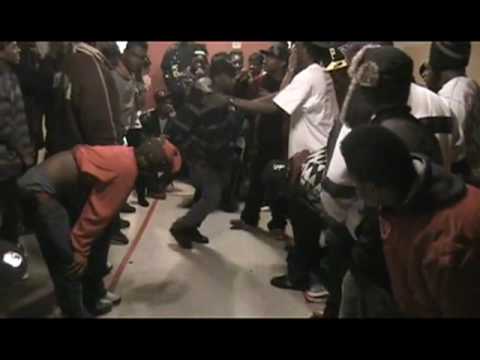"Enjoy the original sound before some douchey white boy sanitizes it and it becomes the next hipster fad. And by ‘some douchey white boy’ I mean me, of course" reads the all-too telling YouTube comment at the top of the Tshetsha Boys’ ‘Nwa Pfundla’ video.
Indeed, what with DJ Mujava’s ‘Township Funk’ being adopted as last year’s unofficial World Cup anthem as well as the popularity of comps like Shangaan Electro, Ayobaness! , The Sound of Club Secousse and Tradi-Mods Vs Rockers, not since the mid-80s has there been a better time for douchey white boys to take their cues from African music.
The white boy in the case of Africa Hitech is veteran genre-hopper Mark Pritchard (Global Communications, Jedi Knights) who, never being one to miss out on a new project, has teamed up with Steve Spacek (from triphop-ish outfit Spacek). Some may already be familiar with their previous shortform releases, also on Warp. First came Blen – a twitching digital workout characterised by an implacable rapid-fire patois that could either be Jamaican or from somewhere in western Africa. This continental ambiguity encapsulates the Africa Hitech formula reflected in their name: a futuristic dance excursion directly informed by electronic music from Africa and the West Indies with an equal helping of latter-day UK and US bass music. Africa Hitech’s remit allows them to connect the dots between any number of esoteric styles – from UK funky and dubstep, Chicago juke, Caribbean dub, dancehall and soca – as well as African electronic dance styles like kwaito and kudoro. It’s an aural snapshot of the global dance scene as it stands – a Major Lazer for grown-ups with an added Old World twist.
Even better than Blen was last year’s excellent Hitecherous EP – six bass-heavy stormers backed by versions galore that truly showed off the duo’s versatility and well-honed production skills. Hitecherous jumps from square-wave bangers (‘Boingy’, ‘Lash Out’), smoky, soulful dub (‘Too Late’) and moody 2-step (‘Said Speed’). Only ‘One Two’, a cross-pollinate of soca, funky and township house, featuring a reprise of Blen’s vocal-stylings, pays direct reference to African music in any big way. All the same the EP’s a riot from start to finish, the only chink in its armour being the overlong opener ‘How Does It Make U Feel’, a repetitive exercise in slow-acid that nevertheless fulfils Africa Hitech’s try-anything-once manifesto.
Watch a video of club kids dancing to Chicago juke or Detroit jit and you might notice parallels with styles like South African Shangaan, as performed by the aforementioned Tshetsha Boys. These geographically disparate genres bear uncanny resemblance in their accelerated 160-180bpms, low-tech production and impossibly frenetic dancing styles known as footwork in the US and pantsula in South Africa. Both Shangaan and juke would still be relatively unknown outside their individual scenes were it not for the passionate collecting and compiling by more “douchey white boys”, including Mike Paradinas of Planet-µ, Honest Jon’s Mark Ainley and Mark Ernestus from Basic Channel.
Yes, nerdy avant-tech fellas can’t get enough of these underground movements. But it’s this discovery and exposure of new styles that inspires a lot of dance music to move forward, especially if it’s backed by a forward-thinking UK record label. As a Warp release of some significance, 93 Million Miles points towards a potential new direction for bass music in the next few years. After all, Warp’s peer label Planet-Mu was responsible for the recent interest in footwork via Paradinas’ Bangs & Works Vol.1. And wasn’t it Rephlex Records who finally cracked dubstep’s inner-circle with the Grime comps back in 2004? While fans of next-step label Night Slugs may already have a peripheral awareness of styles like juke, it’s this release if any that could tip these microcosmic genres into wider global phenomena.
It’s a shame then that 93 Million Miles, for all its creative ambition, falls ever-so slightly flat. Take ‘Do You Wanna Fight’, one of the more immediate tracks on the album but one which reveals itself less and less on each listen. Announced by ominous Waka Flocka synth-horns, the track is dominated by a menacing cyber-Rasta, vocodered over scampering chords and wamping bass. It’s all very exciting, but this heavyweight bombast is mismatched with a sideways clippety-clop of a beat that never manages to anchor things down and even gets drowned out in places. We’re left with one of many moments on the album that feels like a missed opportunity and a failed experiment. Hopefully someone will be along to remix it soon.
Maybe it’s a case of IDM-itis? Warp, much as I enjoy your releases, a lot of your artists sure know how to spoil a good dance tune. ‘Do You Wanna Fight’ sounds over-embellished when all we really wanted was a true banger that’d get the dance on. Perhaps Pritchard and Spacek are too protective of their leftfield roots not to let them creep in and blemish some otherwise top choons. But this is Warp after all – “Intelligent Dance Music” – aren’t these moments all part-and-parcel of what they do? It wasn’t the case on the Hitecherous EP which struck a much better balance between body and mind. With that EP, Africa Hitech proved they could make interesting dance music that wasn’t dragged down by the duo’s experimental tendencies.
Perhaps the real issue with 93 Million Miles is one of context. The footwork sound of Chicago acts as a functional backdrop for the style’s inexhaustible dance-offs. The music is raw and viscerally produced with no room for big build-ups or breakdowns. Footwork tracks aren’t designed for waving your hands in the air. The rhythms stay grounded and intense at all times to maintain a seamless flow for dancers to move to. Some tracks never actually “kick in” in the traditional sense, relying on intense snare patterns and booming sub-bass for added tension. Even aficionados will advise you retune your ears before attempting to listen to footwork at home.
‘Foot Step’ goes some way in paying homage to footwork, taking the essential ingredients, polishing up the production and extending the length to 5:30 minutes. The clamorous unrelenting beat remains constant as with the original sound, but never quite satisfies the senses in an album context and soon outlasts its welcome. The difference here is that footwork tracks act more as DJ tools or riddims as opposed to fully-formed tunes to be enjoyed outside of Chicago warehouses. Again, Africa Hitech suffer from a fear of jettisoning their values and credentials at the hands of a more accessible approach. ‘Foot Step’ sounds at once overripe and insubstantial. There’s a lot going on, but not enough to get one’s teeth into.
So rather than “sanitising” the original sound, Africa Hitech could be accused of excess reverence to it – holding on to the wrong elements of the sound in the name of authenticity. Footwork might have its codes and traditions, but that’s not to say these can’t be bent a little to suit a new environment. The duo might be trying to keep the essence of their influences alive, but if these sounds are going to be deconstructed, why not go the whole hog?
The underground producers being referenced on 93 Million Miles use a primitive production style for maximum effect, largely due to technical constraints. As such they can be forgiven or even commended if a track sounds scruffy and off-the-cuff. As seasoned producers, Africa Hitech’s sloppier moments are less easy to forgive. Some might see this adherence to low-tech values as a good thing, arguing that the rot set in once dubstep had been reworked to appeal to mainstream dancefloors; but when tracks like ‘Light The Way’ seem to rely on bludgeoning repetition to get the point across, it’s hard to defend.
Speaking of which, ‘Out In the Streets’ hinges on the much-loved Ini Kamoze sample, repeated and repeated over an insistent high energy bassline. But again, it’s all build and no release, no peaks or troths, just plain anticipation of a drop that never comes. Again, maybe this is the intention, and possibly a direct reference to Chicago dance music, but it can be frustrating to listen to if unaccompanied by videos of dudes breakdancing.
Despite all this, 93 Million Miles isn’t a bad album – nearly every track has something to offer. ‘Glangslap’ comes close behind ‘Boingy’ as their second tuffest tune to date. ‘Our Luv’ is a sweet and uncharacteristically melodic take on the current Detroit techno revival. ‘Cyclic Sun’ even references the afro-futurist space-jazz of Sun Ra, adding some neat tribal flourishes to the mix. But all too often the album gets weighed down by fussy production logic and dare I say, a slight lack of funk in places. It’s also disappointing to note a toning-down of the African electronic influence that made the earlier EPs so interesting. Anyone looking to explore this side of things should check out the excellent compilation Ayobaness! The Sound of South African House as a starting point. 93 Million Miles’ dominant juke and footwork influences, though very exciting emergent flavours, feel as though the rest of the world hasn’t quite worked out what to do with them yet. The same goes for Africa Hitech whose curatorial approach is at once their strength and their undoing.



